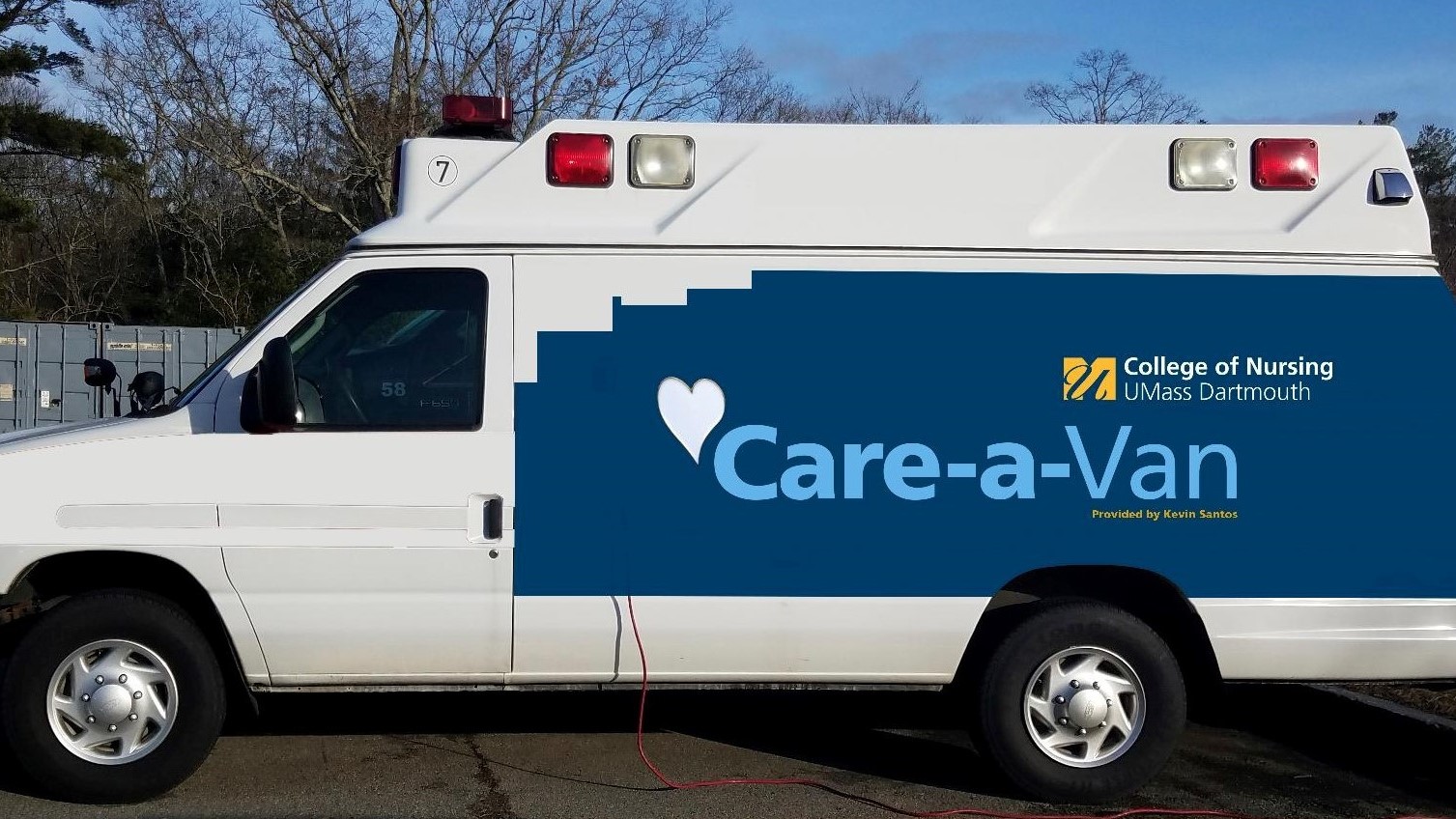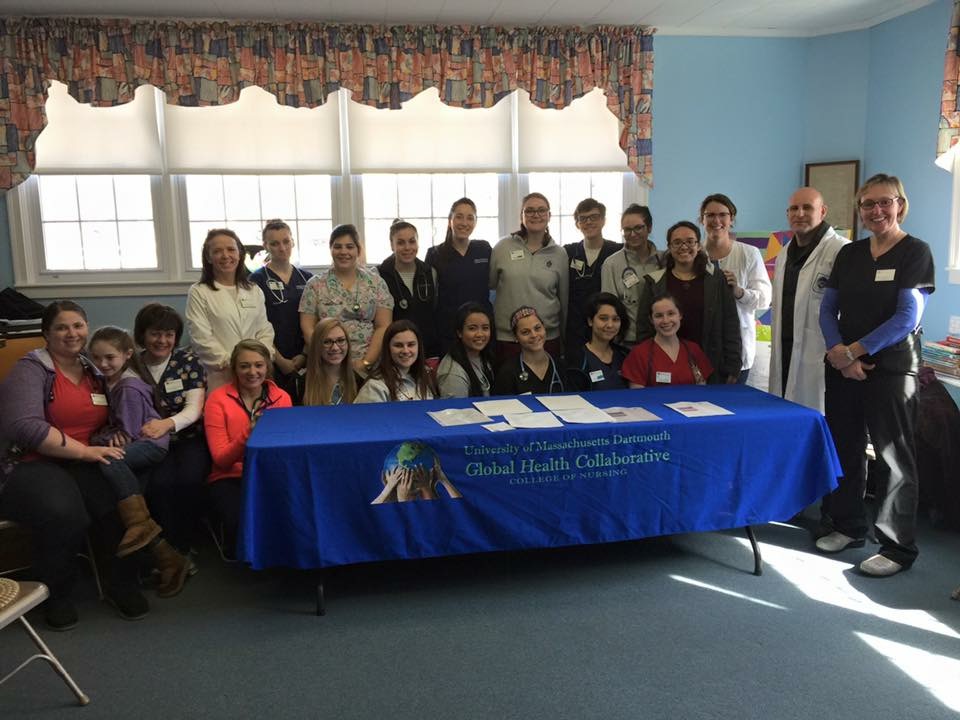Challenges in reaching the most vulnerable in the community were identified at collaborative community forums held in Southeast Massachusetts, United States (US) in 2014 with University of Massachusetts Dartmouth (UMass Dartmouth) leaders, social service agencies, and providers of healthcare services. The barriers to accessing care and health maintenance among this aggregate were associated with lack of transportation, transient status, and being uninsured or underinsured.
Global Health Collaborative team.
Photo Credit: Jack Shipley
UMass Dartmouth College of Nursing students and faculty created a Global Health Collaborative (GHC) university student club to identify the vulnerable footprint in Fall River and New Bedford, and neighborhoods adjacent to UMass Dartmouth. The mission was to create sustainable partnerships among the colleges in the university, local community, and global community to improve the health of populations through engagement and entrepreneurial collaboration. The purpose of GHC was to develop global partnerships, increase global awareness of health-related issues, establish intercultural relationships, deliver culturally competent care to diverse populations, and respect the beliefs, values, cultures, religions, and practices of the populations the College collaborates with.
Background
The Public Policy Center at UMass Dartmouth1 prepares a community needs assessment every three years. The 2016 report included three primary activities of their assessment: 1) demographic and socioeconomic analysis; 2) health assessment; and, 3) key informant interviews and focus groups to identify the priority health needs of the community to ensure that services were aligned with these needs. Higher poverty rates, low education levels, and poorer health outcomes in the cities of Fall River and New Bedford were broadly identified during the assessment when compared to cities in the state of Massachusetts which supported the data gathered at the community forums.1
The UMass Dartmouth campus lies in the center of the South Coast region, between the cities of New Bedford and Fall River and has an established record of civic engagement and service learning. College of Nursing faculty and students confronted the challenge to close the gap to accessing care and promoting health by creating a student club to offer health services to those in need.
Service learning is a teaching and learning strategy that incorporates meaningful community service along with instruction and reflection to enrich students’ learning experiences, teach civic responsibility, and strengthen communities.2 “Service learning allows students the opportunity to practice critical thinking skills” and “presents students with real-world problems to confront, alternatives to consider, and solutions to find.”3
Innovative Solution: Bringing Care to Communities Through Mobile Health Clinics
The GHC consists predominantly of nursing students and faculty and was established in 2014 by 10 junior nursing students upon returning from Haiti as part of a service learning trip. While students were committed to providing health care and education in one of the poorest countries in the Western Hemisphere (Haiti), they began to look more closely at the health needs of the communities in their own back yard.
Free health screening, promotion, and education initiatives in the community were started by faculty and students to better understand the social determinants of health, physical environment, and health behaviors of these neighborhoods and cities to customize care. Oftentimes these initiatives were held in church basements, with supplies brought to each site by faculty. These sites were where the target population felt safe as they trusted the churches had their best interest at heart. Wrap around services at the clinics were available that included: assistance in applying for health insurance, referrals to community health centers and hospitals, transportation to and from appointments, food assistance for women and infants, clothing provisions, a warm lunch, and entertainment for children.
Participating faculty and students are from diverse backgrounds, have cultural competency training, and nursing expertise in an extensive variety of specialties. Many faculty and students live in the greater Fall River and New Bedford area, are bilingual and can translate and interpret for clients, and care deeply about giving back to their own community. The GHC has successfully worked alongside persons and agencies in the country of Haiti, and Mississippi and Massachusetts in the U.S., receiving positive feedback regarding their commitment to work with established partners, and to care for the most vulnerable with compassion and empathy.
An executive board of students across majors collaborate with a faculty advisor to: 1) reach out to the most vulnerable in the community to understand their health needs and concerns; 2) hold specialty health clinics, and educational and referral support to meet these identified needs; and, 3) secure funds for clinic supplies, health promotion materials, travel, and van support. In January 2016, four nursing students and one faculty member attended the Student Run Free Clinic Conference in Phoenix, Arizona, U.S., and gained valuable information and brought new ideas in providing care to communities. Over the past four years, the GHC has grown from 10 student visionaries to more than 100 committed students, from undergraduate through doctoral, and faculty; logging more than 500 service hours to date.

College of Nursing Care-A-Van
Photo Credit: Kevin DeAquai
Distinction
The College of Nursing recently received a donation of an ambulance van (Care-A-Van) from a university alum, allowing for a more formidable presence and larger reach in the community. To date, students, faculty, and community partners have worked closely with families across the lifespan who recently emigrated or are homeless, through city-wide blood pressure screenings in New Bedford in coordination with police and fire departments, by hosting foot clinics in homeless shelters, food/clothing drives for local homeless shelters, and providing immunizations for influenza at public health departments.
The van will allow for more exposure and access to the community to promote heath care related to the importance of physical activity, healthy food choices, smoking cessation, cancer screening recommendations, cholesterol screening, HIV testing, vaccinations, dental care, air quality, injury prevention, alcohol and drug use, lead exposure, cardiovascular disease, stroke, diabetes, and environmental risks.
Funding Support
Funding support for supplies and van operating costs have been obtained through grant funding, in-kind donations, and university groups including Kevin Santos, Island Foundation, Inc. and University of Massachusetts Dartmouth Student Government Association.
Through funding support, students and faculty create new and forward-thinking ways of providing nursing care as the point of care is shifting from acute hospital care to community settings. The potential to offer these opportunities as clinical experiences for students aligns with the entrepreneurial spirit of the Collaborative. Students and faculty plan to organize two dozen trips in the upcoming year to include stops at multiple sites within the community to achieve greater impact.
Implications
Initial work with nursing students directly involved in their communities were related to improving health. The GHC and recent acquisition of the van allowed for students to acquire skills through community engagement with diverse cultures that include: teamwork, leadership, communication, cultural competence, humility, hands on skills, and global awareness.
Conclusion
The greatest measure of success has been to gain trust in the community surrounding the university by building long term relationships which has facilitated the ability of students and faculty to provide quality care to those in need. Barriers include coordinating community events during weekend hours per our partners that align with student and faculty commitments. Creative opportunities for students to engage and learn, while providing a needed service is important as students describe becoming better global citizens through their engagement in domestic and global work with diverse populations.
Works Cited
1. Public Policy Center University of Massachusetts Dartmouth, Southcoast Health Community Needs Assessment. 2016.
2. National Service-Learning Clearinghouse, “What is Service-Learning?” Corporation for National and Community Service, Learn and Serve America (2012), Accessed July 18, 2018, www.servicelearning.org/what-service-learning
3. Jenkins, Amelia, and Patricia Sheehey. "A checklist for implementing service-learning in higher education." Journal of Community Engagement and Scholarship 4, no. 2 (2011): 52-60 (accessed July 24, 2018). link.galegroup.com.libproxy.umassd.edu
Author bio
Maryellen D. Brisbois PhD, RN PHCNS-BC is an Assistant Professor at the University of Massachusetts Dartmouth College of Nursing and faculty advisor for the Global Health Collaborative since its inception.



